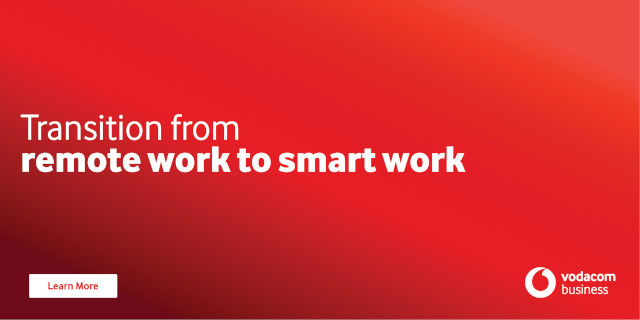Reinventing the workforce in the age of Generative AI
By Industry Contributor 12 March 2024 | Categories: news
News sponsored by Vodacom Transformation of Work:
By Hina Patel, Managing Director for Data & AI at Accenture, Africa
Generative AI (Gen AI) has burst onto the scene. It appeared fast and is evolving even faster. It’s impact on value chains will fundamentally transform the nature of work, reshaping how businesses deliver value and better experiences for employees and customers.
The impact and importance of what people do with Gen AI today and tomorrow cannot be understated. In this age, Gen AI is influencing more than just productivity – it’s impacting processes across the value chain, changing the work itself.
Due to its ubiquity across job types and potential to create exponential impact, Gen AI is poised to provide the most significant economic uplift and change to work since the agricultural and industrial revolutions. The early industrial revolution, for example, was marked by mass production and standardised outputs. The age of Gen AI will be defined by not only productivity gains but also by enhanced human creativity and potential to shape more innovative employee and customer experiences.
For the first time in history, we are embracing a generation of technology that is “human by design.” Gen AI’s effectiveness hinges on human input to drive quality outputs – whether they’re straightforward, like the draft of an email, or complex, like a financial forecast. This shift will lead to a reinvention of work with more human-centric processes across the entire value chain. By synthesising data, comprehending natural language and converting unstructured data into actionable insights, Gen AI is democratising business process redesign, empowering everyone – from frontline workers to lab scientists to design professionals – to reshape their own workflows.
Gen AI can also bring workers closer to their customers. Imagine a banking scenario where Gen AI transforms the customer experience: from using AI-powered analytics to gain a comprehensive view of customer needs, to customising financial products and services based on those needs. This end-to-end change not only streamlines operations; it also helps bankers know their customers better, identify new products and improve experiences for both customers and employees. All these outcomes positively impact the bottom-line.
In fact, our research shows that Gen AI offers a trifecta of opportunities: it can accelerate economic value and increase productivity that drives business growth, while also fostering more creative and meaningful work for people.
Most organisations view Gen AI as a path to greater innovation, presenting more of a revenue-growth play than a cost-reduction play. And when it comes to the workforce, Reinventors – representing 9% of organisations in our research – are 2x more likely than other organisations to anticipate productivity gains in the next three years. And two out of three strongly agree that, with Gen AI, work will become more fulfilling and meaningful.
However, new technologies come with concerns. About 95% of workers see value in working with Gen AI – but their top concern is that they don’t trust organisations to ensure positive outcomes for everyone. Our research explored the factors that contribute to this trust gap.
Currently, three-quarters of organisations globally lack comprehensive strategies and initiatives to ensure positive employee experiences and outcomes with Gen AI. And two-thirds of Chief Experience Officers (CxOs) we surveyed confess that they are ill-equipped to lead this change. Misaligned perceptions between leaders and workers also erode trust. When it comes to job security, 58% of workers are worried, yet less than one-third of CxOs feel job displacement is a concern for people. There’s another disconnect when it comes to well-being, with 60% of workers concerned that Gen AI may increase stress and burnout, compared to only 37% of leaders who see this as an issue. This lack of trust puts the trifecta of opportunities at risk.
There’s a way, however, for leaders to close the trust gap and accelerate Gen AI integration: Look at and emulate how leading organisations are leveraging Gen AI in ways that are better for business and the people. Leaders should view their people not as passengers on the journey, but as navigators.
The Gen AI opportunity is clear. So, too, is the fact that organisations and leaders need a “Gen AI GPS” that not only lays out both the journey and the destination, but that is also adaptable for an ever-changing landscape.
With only a small percentage of organisations leading when it comes to reinvention and Gen AI, there’s substantial opportunity to be among the front-runners. Our research and interviews have identified key accelerators and actions to realise Gen AI’s full potential through reinventing work, reshaping the workforce and preparing workers for the future.
But success in this age of Gen AI relies heavily on leaders who are willing to learn continuously and deeply – particularly when it comes to the technology, who lead with compassion and humility and who create the conditions so that their people feel “Net Better Off” at work. That’s why our Gen AI GPS starts with us, the leaders.
So, for leaders to be effective in the Generative AI era – a time when being tech-enabled and people-powered has never been more important, they will need to prioritise human-centered change efforts and learn in new ways to scale this groundbreaking technology responsibly, to create value, as well as to ensure that work improves for everyone. This means setting and guiding a vision for how to reinvent work, reshape the workforce and prepare workers for a generative AI world, while building a resilient culture to navigate continuous waves of change.
Most Read Articles

Have Your Say
What new tech or developments are you most anticipating this year?




